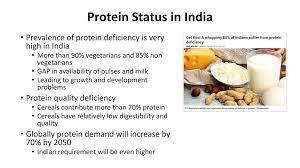9 Hidden Signs of Protein Deficiency
What are Proteins?
Proteins are the large molecules, building blocks of tissues that are required by our body to perform various functions. Proteins are generally required for :
Cells require protein to produce enzymes and hormones.
Protein helps in the healing of body tissues.
It helps in blood clotting.
It makes the immune system strong.
Protein plays a vital role in the absorption of essential nutrients in our body.
It is the foundation of your hair, body muscles, and skin.
It helps in transporting oxygen.
In an emergency (due to low carbohydrate), protein also provides energy to the body.
How Much Protein is Required?
The body's protein requirement is based on various factors such as age, gender, and physical activity of an individual. Since protein is required to perform different metabolic functions, the protein requirement varies for every individual. However, according to RDA(Recommended Dietary Allowance), adults need .8 grams of protein per kilogram of body weight every day.
Look Out for Nine Hidden Signs of Protein Deficiency
Doctors prescribe a balanced diet with an adequate quantity of protein for healthy living. Protein deficiency has significant health hazards for individuals. The following nine hidden signs of protein deficiency should never be overlooked :
1) Weak Immune system
Deficiency of protein results in a weak immune system. As a result of protein deficiency, an individual falls sick very frequently.
2) Changes in your skin, hair, and nails
Brittle nails, dry skin, hair loss, and dull hair are also signs of protein deficiency.
3) Your body healing suffers.
Proteins help repair and rebuild new cells and tissues in our bodies—the deficiency of protein results in the body's slow healing process.
4) Bones fracture easily
Your body needs a sufficient quantity of protein to build muscles and increase bone density. The deficiency of protein results in muscle wasting and increases the threat of bone fracture.
5) Loss of concentration
Lack of concentration or difficulty focusing on things and problems in retaining information also indicates protein deficiency. Proteins are required for the proper functioning of neurotransmitters in your brain. The lack of protein thus results in poor concentration.
6) Difficulty in sleeping
Protein is required to create neurotransmitters like serotonin that regulates the sleep cycle. The deficiency of protein causes serotonin deficiency leading to insomnia.
7) Mood swings and depression
Mood controlling neurotransmitters such as dopamine are synthesized by protein. These compounds, when available in less quantity due to protein deficiency results in mood swings or depression.
8) Loss of stamina or fatigue
Protein intake facilitates the absorption of vital nutrients such as iron in our body. With a low nutrient intake body, stamina suffers adversely. A person feels fatigued quickly, another hidden sign of protein deficiency.
9) Unexplained hunger
The protein-rich diet reduces ghrelin levels, a hormone responsible for stimulating hunger. Thus protein deficiency can lead to increased sugar cravings and body weight gain.
What Are The Diseases Caused Due To The Deficiency of Protein?
Two major diseases caused due to protein deficiency are-
1) Kwashiorkor - Some common symptoms of kwashiorkor are :
Ø Edema
Ø Failure of growth
Ø Moon face
Ø Skin and hair changes
Ø Irritable behaviour
2) Marasmus - Some common symptoms of Marasmus are:
Ø Muscle wasting
Ø Failure to thrive
Ø Growth failure
Ø Different kind of infections
Both the diseases caused due to deficiency of protein intake is frequently detected among poor young children in developing nations.
How big is the problem of protein deficiency in India?
According to the recent studies conducted by IDA (Indian Dietetic Association), the protein consumption among Indians is deficient. Studies further elaborated that nearly 84% population in the country are protein deficient. Moreover, inferior health muscle is prevalent among 71% of Indians. The problem of protein deficiency is found in both urban and rural India.
How is Protein Deficiency Detected?
The deficiency of protein in the body can be easily detected through blood tests. Test to determine the level of protein in the blood is called the total protein test. By identifying the level of two proteins, namely, albumin and globulin in the blood, protein deficiency can be ascertained.
What Are The Causes of Protein Deficiency?
There are different causes of protein deficiency in the body. Some of these causes are discussed below.
1) The poor dietary choice is one of the prime reasons for protein deficiency. A large section of Indians are vegetarians that augment the problem of protein deficiency.
2) Liver and kidney disorders are also responsible for protein deficiency in the body.
3) Lack of awareness among the general population regarding the requirement of an adequate protein intake quantity is another major factor for protein deficiency.
4) Celiac disease can also lead to protein deficiency.
5) Inflammatory bowel disease is another cause of deficiency of protein in the body.
Summary
Protein is an essential nutrient for a healthy human body. The proteins are required to perform various normal body functions; hence protein deficiency may result in health impairment. Therefore, it is advisable to consume sufficient protein quantity in our daily diet to remain healthy.





No comments:
Post a Comment